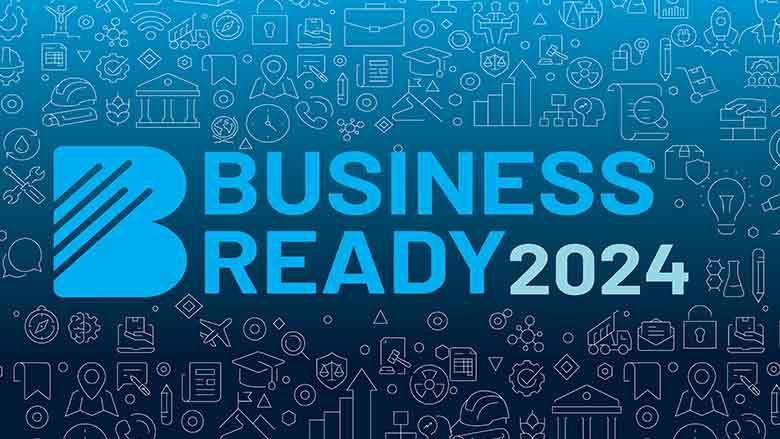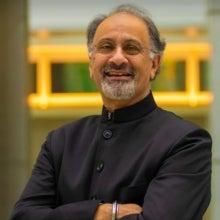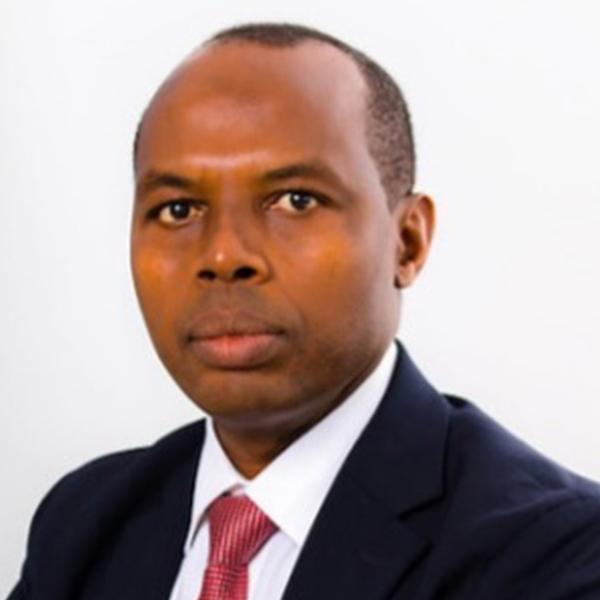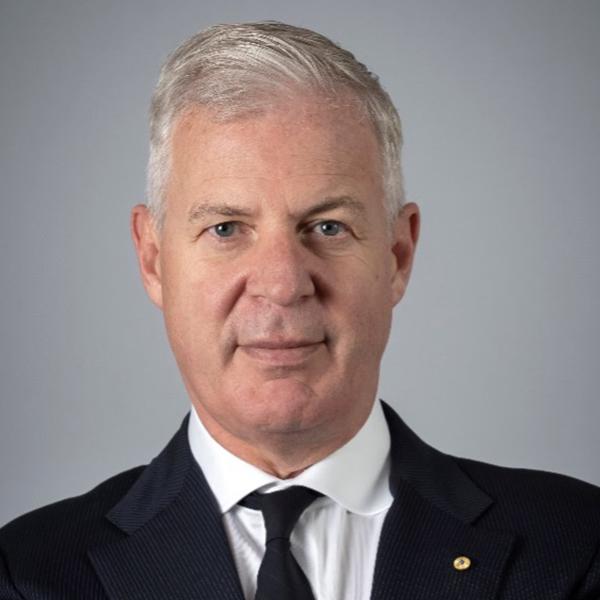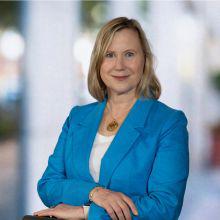[Claire Jones] Good morning to you all here in person and online. It’s a pleasure to welcome you to the World Bank’s Headquarters here in Washington, DC. My name is Claire Jones. I’m the International Economy News Editor of the Financial Times, and I’m thrilled to welcome you here today to mark the launch of the inaugural edition of the Business Ready report. Business Ready or B-READY is a landmark report, which, through the use of quantitative methods, aims to shed light on the corporate climate around the world. The aim is to improve economic outcomes not only for businesses, but for workers, consumers, and the natural environment. Today, we’re going to delve into the complexities and challenges of promoting business reforms that create the conditions in which the private sector can thrive. We’re looking at achieving that of an elusive combination of conditions that will reduce poverty, advance share prosperity, and speed up the transition to a low carbon economy. It’s now my pleasure to introduce Indermit Gill, the World Bank’s Chief Economist and Senior Vice President, and Alice Fulwood, the Wall Street Correspondent for The Economist, and the host of the fantastic podcast, Money Talks. They will explore how the private sector can help rescue slow how growth and how a conducive business environment aids this. Over to you guys. Thanks a lot.
[Alice Fulwood] Thank you so much. And thank you to Claire for that lovely introduction. I’m delighted to be here with you today, Indermit, to discuss B-READY and its launch. I guess before we get to the meat of B-READY in particular, could you help me set the scene a bit? It’s a very challenging time for development economics. Just a couple of weeks ago, The Economist put on its cover, “How the world’s poor stopped catching up.” Convergence seems to have stalled. Extreme poverty is no longer falling. And a decade ago, it seemed like we maybe had a lot more figured out. So, what’s happened?
[Indermit Gill] So first, thank you, Alice. We are really grateful that you and Claire have traveled all this way to be with us today. You may notice that, actually all of you may notice that Norman Loayza and I are both a little nervous today. The reason is not that we have any doubts about the B-READY report. We think that Valeria [Perotti] and her team have done a wonderful job. We have no doubts about the report. The reason why I’m nervous, and I think Norman, too, is that Professor Robert Barrow is here, and he is both Norman’s teacher and mine. I learned macroeconomics from him at the University of Chicago before he decided that the quality of students like me in Chicago was not good enough. And so, he had to move to Harvard to get better students like Norman. But I am really happy to see Bob Barrow here. A huge welcome to you from all of us here at the World Bank, Bob. I do want to tell you that the B-READY project, it’s a big deal for us. And you know that we were doing the ease of doing business ratings and we stopped that about three years ago, September 2021. So, to answer your question now, between that time and now, the world economy has gone to hell in a hand basket, essentially. Essentially, advanced economies are doing less well than they did before the pandemic. Middle income countries, many of them, other than a few exceptions like India and Indonesia, they’re not doing particularly well either as compared to the... So, everything is settling to a lower growth equilibrium, essentially, than compared to before the pandemic. And by the way, that, Alice, was even lower than what had happened before the global financial crisis. A step down, down, down, right? Both times. What basically has happened, I think, is that governments have basically tanked their public finances. High levels of debt, very little fiscal space for public investment and so on. Consumers took up a little bit of that burden and actually spent. That’s waning, too, now. The only thing left is private investment. In fact, actually, if you think about the importance of private investment three or four years ago and compare it to now, it’s much greater. We are going to rely on private investment to pull us out of the woods now. B-READY, it basically breaks what countries have to do to make businesses start to invest again. That’s how… I actually feel that the three years that we have not had the B-READY project and we didn’t have the Doing Business project, were the three years that really did matter for private investment. We are three years late, but as they say, better late than never.
[Alice Fulwood] Okay. You mentioned in your answer there that you haven’t been doing the ease of doing business index. That was a huge deal for the Bank. I recall, before I was a journalist, I used to be an economist in Southeast Asia, and I would build these little tables of key economic indicators that I would show to investors, so economic growth, inflation, credit cycle metrics, and the ease of doing business index was always on those little scorecards. When I would talk to finance ministers in emerging markets, they would always talk proudly of the things they were doing to improve their rankings on the ease of doing business measure. It was hugely influential. Why the need for a revamp and what do you hope will be the influence that B-READY might be able to have?
[Indermit Gill] I won’t get too much into doing business because we’re trying to move on from that, but you’re right. I think it was probably the most influential regular report of any multilateral organization. I mean, in terms of the reforms and so on that actually were traced back to that. In some sense, actually, it was a victim of its own success because it started to get treated really seriously. You had governments of fairly large countries actually have a Department for Doing Business, which was the whole aim of that exercise was to just improve their thing. Then, we had a very shameful period here at the World Bank where we didn’t actually look after that project well. We let it be compromised. What we’ve done now is that we’ve come up with a really fantastic new report. What it does is it’s more balanced than the ease of doing business, it’s more representative, it’s more transparent, and we think it’s more constructive. I’ll just say a quick word on each one of these things. In terms of the greater balance, first is that we’ve actually included environmental aspects, gender aspects, social standards, digital developments. We’ve actually made it much more balanced. We are talking about business regulations and so on from the viewpoint of societies rather than just businesses or just workers or anybody else. Second one, more representative. Those are the people who actually use it doing business. They didn’t fully appreciate the fact that this was supposed to be just for small and medium enterprises. It was not for all enterprises. One of the things that we’ve done is that we’ve actually extended this now, not just to small, medium enterprises, but also large enterprises. In some sense, this exercise is much more suited for the way doing business was interpreted because it was interpreted as something for the entire business sector. Now, it is. The other thing is that back then, what we did was we used to survey experts in one city in most countries, and two cities in countries that had more than 100 million people. And that was representative enough at a national level in some sense, but what we’ve done now is that we now have actually nationally representative enterprise service in addition to those expert services. So, it’s become much, much more representative in that sense. Transparent. This is a lesson that we learned from the last time. Transparency. I mean, all the data on the web, all manuals on the web, none of the experts we survey are anonymous. That’s a part on the transparency. Everything is done out in the open, in sunlight, bright sunlight. But now what we’ve also done is that we’ve also strengthened internal integrity mechanisms, and all of that stuff is on the web, too. More constructive. We’ve tried to make this a little less zero-sumish in the sense that we don’t want to encourage unhealthy competition between countries or between parties within countries in the sense of exploiting a particular weakness of the ruling party, etcetera. The other thing, of course, is that we actually want to discourage gamesmanship. The whole idea here is not to think. The way that the report is presented, the way that it’s designed, the way that it’s executed, the data that we rely on, everything has changed. This is a brand-new report. [Alice Fulwood] Okay, so at the beginning, you talked about the need for private investment to step up, to achieve… [Indermit Gill] To save the world.
[Alice Fulwood] To save the world, yes. Very, very low-hanging fruit goal. We’ve heard a bit about how B-READY works and what it’s intended to do. I guess, how do you hope that B-READY will help you achieve that first goal of stoking private investment and helping to save the world?
[Indermit Gill] I guess the broadest way to think about this is to say, “Okay, what is it that we are asking governments to do?” Essentially, what we are saying is to create a better environment for business. Now, that’s an easier thing to say than to actually do. What we are trying to do with this report is break that down into a thousand indicators per country based on 2,000 data points for each country. What we are trying to do is that actually help governments to break this problem of improving the conditions for business into manageable pieces. Now, given the fact that it’s not just the things that B-READY covers that actually matter for the investment climate, things like monetary and fiscal stability matters, infrastructure quality generally matters, and so on. The size of the economy matters, those things. One of the things I think that the best way to think about it is that we would like B-READY to be used with some responsible use warnings. There are three or four of them. The first one is, don’t consume B-READY raw. It’s going to give you a stomachache. Don’t consume it on an empty stomach either. It’ll give you a stomachache again. Use it with other data, like fiscal and monetary quality and things like that. Then you start to see your... Now, the second thing is, remember what the report is assessing. We don’t want people to say something like, “How can you say that Nepal is doing okay on operational efficiency when the Nepalese economy is really doing badly and the Nepalese are leaving in droves?” You have to remember that we are basing that operational efficiency on a subset of those 2,000 data points. Before you criticize the thing, this is not a smell test of the country. This is an actual assessment based on indicators that are as objective as we could make That’s the second part. You can have an economy that is doing poorly, and you can have a business-ready environment that is improving a lot. Those two things can be true at the same time. The second thing is that we are trying to not get countries to focus just on one thing. One of the things that we have done here that we don’t have one aggregate indicator, one aggregate ranking for a country. We instead have three. One has to do with the quality of laws, the other one has to do with the quality of public services that are used to support these laws, and the third part is the efficiency with which these services and these laws can be complied with or these services can be used. There are these three categories. Now, when we did an aggregate ranking, you could have a country that actually comes out right on top. What was hidden then was that it actually didn’t do that well on one aspect, let’s say, operational efficiency, but it still came out on top. Now what will happen is that you’ll see that this country is actually doing really well on laws, is doing really well on public services, but then there’s one aspect of operational efficiency in which it doesn’t do well. This can be exploited for political gains by the opposition and so on. They shouldn’t do that because they should take the overall report card, not just one particular aspect of it. I’m actually giving you a particular example from Croatia here. Croatia is doing brilliantly, actually, on both, the laws, as well as on the public services to support these laws. There’s one aspect of operational efficiency in which it could do better. It probably is already working on that right now, but you can easily have this exploited for political purposes. Say, “Oh, we used to do really well, but now we’re not doing well on that aspect.” That’s one of the flip sides of not having an aggregate ranking. Two real quick things, sorry. One is, exercise common sense. There’s never any substitute for that. If the report has indicators that are based on a survey that was done in August of 2023, and the country has been bombed after that, then obviously, you have to understand that what we are trying to do with the report is to show what was the quality of the laws that we cover here and the public services that support them and so on, before all of those things happen. One just has to exercise common sense there. I think, in general, we are putting all of these data up on the web. We are making everything transparent and so on. Before you praise the report, actually, there’ll be a lot to praise in the report you’ll see, including the cover like this one here. But before you praise Valeria in a report, read the report. Before you criticize the report, read the report, and look at the data. Then you’ll actually see that the assessments that are summarized in the report are actually based on a massive amount of data. These data are going to be public goods.
[Alice Fulwood] Okay, well, with all of those digestion and health warnings, as well as your advocacy that everyone should read the report before they make up their minds Indermit, I think that’s what we have time for. But it’s been a pleasure getting into it a little bit with you before the rest of the event. Thank you so much for joining me.
[Indermit Gill] Thank you very much for giving me the chance.
[Alice Fulwood] Thank you. [Applause]
[Claire Jones] Thank you, Indermit and Alice, for that very thorough user’s guidance to the new report and quite an honest reflection on some of the failings of its predecessor. I’d now like to welcome onto the stage, Norman Loayza, who, along with being a former pupil of Robert Barrow, is also the Director of the Global Indicators Group here at the World Bank. Norman is now going to give us a short guide into the key findings of this inaugural report for 2024. Norman, it’d be great to have you up on the stage.
[Norman V. Loayza] Thank you very much, Claire, and good morning, everyone. No country has been able to develop without sustained economic growth. And with economic growth comes opportunities and transformation, opportunities for workers and for entrepreneurs. There is indeed great need for economic growth. For middle-income economies that have 75% of the population and two-thirds of the world’s extreme poor, the need for growth is large. In fact, in order to escape the middle-income trap, they will need to grow at a rate of 5% of per capita GDP growth in the foreseeable future. The need for growth in low-income economies is even larger. For example, for sub-Saharan African economies, in order to escape and eliminate extreme poverty over the next decade, they need to grow at an average of 9% per year. Now, the key for economic growth is a vibrant private sector. To be sure, the private sector is already an economic giant. In fact, it employs 90% of workers, produces 70% of output, 75% of investment, and it provides 80% of government revenues, but oftentimes, the private sector is stagnant. It is like a sleeping giant. So, how do we wake up this sleeping giant? The private sector can indeed be an engine of growth. It can be an engine of growth if the business environment conditions are favorable, meaning that if barriers are brought down and enablers are put in. In this way, the private sector can become large, complicated, sophisticated, dynamic, providing all the opportunities that are needed for workers and for entrepreneurs. So, the question then comes, what makes for an enabling business environment? And this is the question that we want to address in this report. So, Business Ready 2024 is the report that we are launching today, is the first installment of a series of three reports that will be the full rollout of this project that by 2026 will give us an assessment of the business environment for nearly all economies around the world. This report, the 2024 edition, gives us an assessment of 50 economies that represent different regions around the world and also different economic levels. The report is divided into topics that follow the life cycle of the firm: business entry, business location, utility services, labor, financial services, dispute resolution, taxation, international trade, market competition, and business insolvency. Maybe life cycle actually is a good term here because life cycle is a term that evokes firm renewal, it evokes innovation, and also creative destruction. Without these elements, you cannot have a dynamic private sector. We also have pillars, the three pillars that in the middle part that refer to the regulatory framework, that is the set of rules and regulations that firms must follow as they open, expand, operate, and maybe close a business. Public services are the facilities that support compliance of regulations, and also the infrastructure at the institutions that enable business activities. Operational efficiency measures the ease of compliance with regulations, as well as the effectiveness of these public services. Here, we provide some examples to ground a bit this concept. The first example is taken from business entry. The second example is taken from business location. And the third is from dispute resolutions. Now, let me tell you briefly about something that I believe is important in terms of understanding this structure. This structure creates a new paradigm for a government’s positive role in the economy. The role that the government can play is very well defined in this case because the government can support this vibrant business environment by setting up high-quality regulations, by providing well-designed public services, and also by ensuring that these regulations and these public services are not just left on paper, but also put in practice. We have two data sources. We have expert questionnaires, and we have enterprise surveys. This is the first time that we take into account the views from both experts that are very familiar with the business environment and with the firms directly who must have these operations on a daily basis. We have about 75 experts per economy and about, on average, 60 firms that we collect information from. This, of course, changes with the size of the economy and the complexity of the economy. From expert questionnaires, we mostly get the answers related to the first two pillars, de jure, some de facto as well. From enterprise surveys, we mostly collect information on de facto. Expert questionnaires and the responses will be updated every year. And enterprise surveys being more costly to undertake will be updated every three years on a three-year cycle. So, let me give you a preview of the results. The first thing to notice is that we are providing, as Indermit just said, 1,200 indicators for each economy. They are based on about 2,000 data points. In this way, they can provide a compass and guide for detailed policy reform. Let me give you a few examples to understand from all this complexity, from this 1,200, what we can actually learn. Just three examples. The first one comes from the first pillar, regulatory framework. While over 70% of economies mandate paid annual leave for workers, only 30% require a periodic revision of health and safety regulations. From the second pillar on public services, over 90% of economies have online tax portals. These are very useful, but only 4% have these other services that can make them very user-friendly. The third pillar on operational efficiency. On average, firms face four electrical outages per month, where the number can be as high as nine outages, or 29 in some economies. Now, in order to summarize these results, and also order in to provide a better sense for weaknesses, and also areas of strength, we provide some scores. We provide these three scores for each of the three pillars, and we also provide 10 scores corresponding to the 10 topics. To illustrate, let me compare the pillar scores that we find for high-income and in low-income economies. You can see that they are indeed very different. But one important aspect about this pillar scores, is that they range from zero to 100. We can understand this score as fractions or percentages of business readiness. We can refer to this score as having that concept of business readiness. In this case, for instance, on public services, we can see that high income economies are about twice as business ready as low-income economies are. We can also, as a way of illustrating the examples of these scores, we can look at topic scores where we can identify specific areas of, again, strength and weakness, and with the hope that those areas of strength will then be improved. Here we have Costa Rica, blue, Côte d’Ivoire, green. What we notice is that Costa Rica does well on business location and also on market competition. It doesn’t do that well on taxation. In contrast, Côte d’Ivoire does well on taxation, but not so well on financial services. So, this is at a high level, something that allows us to then explore deeply and go into these 1,200 indicators to understand what’s going on. Now, I have told you about the structure and also about what we present in terms of quantitative measures, but we can also take a look at the overall set of results and draw some conclusions. So, these are what we call the key takeaways. The first message that we have of Business Ready 2024, still a preliminary message because we need to conclude the rollout by 2026, is that despite the great need for economic growth and job creation, most economies, especially those in developing countries, are not business ready. But let me be more specific. There are about two-thirds business ready regarding the quality of business regulations, and worse, only half business ready regarding the effective public services. Now, there’s a difference here. Two thirds and one half between regulations and public services. This actually indicates a public service gap. That is, a difference between the highest scores of regulations and the lowest scores of public services. Maybe we should have anticipated that this would be the result because it takes more resources to actually put in place these public services and to make them effective. We compare this public service gap for different levels of income, and what we find indeed is that the gap reduces as the income of the country increases, and this public service gap is three times as large for low-income than for high-income economies. It’s only natural to ask what countries perform well on a business rate. So maybe it’s not surprising that wealthier countries tend to do better. And I will highlight just two examples here. One of them is Singapore. Singapore is well known for being a pragmatic, business friendly economy. Estonia has been a leader on the digital adoption to provide better services for people and for businesses. Maybe more surprising is a finding that countries do not need to be rich to develop a favorable business environment. Let me give you a few examples. The first is Rwanda. Rwanda scores on the top 20% of 6 out of 10 in the topics. Maybe for this reason and for the fact that they have been working on the business environment for over many years, is that in the last decade, they were able to double the size of the economy and also double the size of FDI coming into the economy. Georgia is a country that also punches above its weight. Georgia is particularly well scored, particularly well business rating regarding operational efficiency, and also is in the top 20% in seven out of the 10 topics. Perhaps for this reason, Georgia has been growing at a rate of 5% in the last 10 years. Colombia does well on the first two pillars, regulatory framework and public services, though not so well on operational efficiency. Vietnam, maybe in contrast, does not so well on the first two pillars, but quite well on operational efficiency. To end, in conclusion, let me tell you how important data is for reform. We actually believe that data and evidence should guide all policies, but in particular here, data and evidence should guide the policy reforms that are undertaken to improve the vibrancy of the business environment. I think it’s best to learn, not from accidents, but actually to learn from good data and good evidence. And for that, you have Business Ready. Thank you very much. [Applause]
[Claire Jones] Thank you, Norman for that very insightful overview. It’s now my pleasure to welcome onto the stage, Moroccan entrepreneur Ismael Belkhayat, co-founder and CEO of Chari. In 2022, Chari won Disruptor of the Year at the African CEO Forum. Ismael now is set to talk about his experiences in navigating the peaks and troughs of the business environment. Ismael, the floor is yours. [Applause]
[Ismael Belkhayat] Thank you. I have a microphone. I will be using the stage. It’s a pleasure and an honor not only to represent the entrepreneurs of Morocco, but also entrepreneurs from Africa and from all developing countries. Norman asked me to be candid and genuine. I’ll be sharing with you a personal experience. I’m born and raised in Morocco, and after high-school I went to Europe for my undergrads. When I got my degree, I started interviewing for jobs. And of course, when you ask for a job, one of the questions you are asked are, “What’s your plans? What’s your career path? How do you see yourself in five years?” And like Norman asked me, back at that time, I was also a genuine and candid. I only say it that my ambition was to get some expertise, some experience, and then go back to my country to become an entrepreneur. And guess what? I wasn’t getting the jobs. And the reason is I wasn’t credible. Put yourself in the shoes of the interviewers. You have this gentleman coming for a job and saying that he wants to go back to Africa when millions of Africans are trying to come every single year to Europe. So, reality is these guys were only wondering how difficult it is to be an entrepreneur in our geographies. The reality is it is very difficult. Let me share with you only a few examples. First, market sizing. If you take the 54 markets and countries of Africa, their GDP is smaller than California only, right? So, when you build a service, you will find more clients in one neighborhood of Palo Alto than in a whole country of Africa. Think of it. Fundraising. I am a startup. Building a startup is not easy. You need to raise funding because usually the first year, you are not profitable. And in order to raise funding, you need to meet with people who would understand what you do. Unfortunately, we don’t have that many VCs in our geographies. Business angels don’t have the right mindset. When you ask for a check, they ask you for 50% of your company. So, you need to speak with foreign VCs. And when you speak with foreign VCs, believe me, you spend more time explaining your market than explaining your business. I remember this VC who, after 10 minutes of explaining what my company was doing, he asked, “How is the Prince of Monaco doing?” Prince of Monaco? Morocco. Morocco is in North Africa. Thank God, in the meantime, we made it to the semifinal of the World Cup. We are organizing the World Cup in 2030, and I don’t need anymore to explain where Morocco is. But you have also many other issues, including regulatory. Not everything is digitized. Everything takes more time, including trust. People don’t necessarily believe in startups, and they are right. Nine startups out of 10 ends up dying. So, when you are a big company, why would you take a risk by giving a contract to a startup that may end up dying? Chicken and egg problem. And you have to fight against this. Norman, you spoke about infrastructure. Yes, there are issues with infrastructure. Myself, I run an e-commerce company. Very difficult to deliver parcels to people when the addresses in your country are not very precise. I suggest you try to leave a parcel in front of a door like I have seen here with Amazon. Try to come back 10 minutes later and check if your parcel is still there. Think of issues with financial inclusion. People don’t have necessarily payment cards like here to pay online, so they ask for cash on delivery, but when you are not paid in advance, your return rate as an e-commerce company goes up because the people haven’t paid you. When they receive the goods, half of the time they want to return them. Plus the logistics, plus the roads, plus the cost of the gas, and so on, and so on. So, my interviewers were right not to believe me when I was saying that I wanted to go back to my country. And I wasn’t credible, but I did. Ten years ago, I came back to Morocco. And you know, like everyone here, I have this little voice, what I call myself, my mental cinema. I’m sure you all have your voice and your own cinema. When you’re an entrepreneur, the same day within this cinema, you can have love movies, and horror movies. Love movies, horror movies the same day. And you keep asking yourself, “What would my life have been if I had stayed in Europe, in the US? And it’s difficult to live with it, but I’m happy to be here today because with hindsight, if I had to choose again… Not a single second, I would doubt I would come back again, and again to my continent and to my country. Let me tell you. One, for business reasons. Yes, you’re right. A lot of issues. I agree. But we still have a market. We still have people who love testing new services, who are in need of finding new services. Competition is not as tough as here. When you start something, you don’t have 100 competitors. We have an amazing human capital. People in Africa, believe me, are as great as the guys you can find in Mountain View. And we don’t need to be geniuses to find out about the next big thing because we just need to take an airplane ticket, go to developed countries, or even more advanced developing countries such as Southeast Asia, find out about the new trends, get some ideas, go back to our countries, and we know by fact, given that we have the same macroeconomics, then in two, three years, the same models will come. And sometime, our innovation is coming from adaptation. When you are a person that is ambitious and that wants to work hard, there is no reason on Earth not to succeed in a developing market. But business is not everything, right? Sometimes we hear that the successful entrepreneurs are those who raise a lot of money, have a company that is valued above a billion dollar, is building unicorns; but to me, that’s not the most important part. Of course, you need to have a decent life and make a good company; but these developing countries give you something that money can’t buy. Remember the advertisement of MasterCard? There are some things that are priceless. Developing countries give you these priceless things. And let me tell you what they are. One, feeling that you are having a real impact. That you are improving lives of people like you who grew up in the same mother countries, people who need you to come back and help and improve their daily lives. Not only you create jobs, but you bring services that improve daily lives and many people feel that they want to stay in your country and not live and go abroad. When you are having impact, there is this self-esteem energy that tells you are on Earth for a reason. And even though your GDP is 50 times lower than the one of California, the energy you are getting in the morning is just amazing. So yes, indeed, being an entrepreneur in Africa has ups and downs. Yes, indeed, Norman, being an entrepreneur, you have to go through all the problems we’ve seen earlier, but what is happiness? It’s not necessary achieving your goals. It’s sometimes just enjoying the path towards trying to achieve your goals and making the most of your daily life by being next to people for whom you count, by being next to people who are like you, by trying to make your country be better for your kids. That’s to me, the real definition of happiness. When you get the blessing from your parents, from your mom, from your father, from your siblings, from your friends, from your society. So, I will conclude with this. Again, it’s an honor to be here, and if I had to leave with one message, I would send it to all these amazing young people, coming from Southeast Asia, from South America, from Africa, who got lucky to end up studying in the best universities in Europe, in the US, and who are today wondering if they should go back to their countries or stay where they are. Of course, it seems easier to stay in Europe and in the US. Life is amazing here, but again, there are some things that are priceless. Your countries need you. What we’ve seen today is how to become business ready and developing countries at are inflection points. And to become business ready, they need human capital, and you guys are the human capital. So, please come and help developing country become better places to live. [Applause]
[Claire Jones] I think it’s always easy to see reports such as these and their findings as mere abstractions. Ismael, you just did a blistering job of just reminding us how real reforming the business climate can actually be. Kudos. Really great talk. It’s now my great pleasure to moderate our panel discussion, and I’d like to welcome our four panelists onto the stage. First of all, I’d like to introduce Mauricio Cárdenas, the former Minister of Finance in Colombia, who’s now a professor at Columbia University. I’d also like to welcome onto the stage, John Denton, the CEO, sorry, the Secretary General of the International Chamber of Commerce. John, pleasure to have you here. Next, it’s my pleasure to introduce Francis Gatare, CEO of the Rwanda Development Board. Then completing the lineup, it’s an honor to have Susan Lund, Vice President for Economics and Private Sector Development here at the International Finance Corporation, where she leads a global team that provides economic and analytical support to IFC investments and private capital mobilization. Thanks a lot. So, over the next 30 minutes, we’ll attempt to answer a question crucial to growth prospects the world over. What reforms are needed to improve the business environment. The Business Ready report marks a decisive shift from focusing solely on what governments can do for businesses to providing a more balanced holistic view, considering what can businesses do for the overall good of society. It introduces a comprehensive analytical framework that goes beyond the ease of doing business report to include quality of regulations and the public services necessary to also lead to reforms in areas such as climate change. I’d like to begin by asking the first question to Mauricio. You reviewed the Business Ready report’s predecessor, the Doing Business report in 2021. Are you satisfied that the new report takes into account the recommendations you put forward?
[Mauricio Cárdenas] Well, first of all, thanks, Claire. Congratulations to the team, Indermit, Norman, Valeria. Thank you for putting this together. Thank you for putting me in the panel. Look, I’m very satisfied. I have to say that our report that was submitted in 2021 I provided a set of recommendations for a comprehensive change to the Doing Business. I think this report, the Business Ready, does that to a large extent. I was Finance Minister of Colombia, and when I was Finance Minister, I tried to do reforms, some of them increasing our tax revenues. At that time, I felt I was fighting against the Doing Business. The Doing Business was not the ally. I think the reason is that too much emphasis was placed on the cost and the cost of taxation, for example, not so much on the importance of the public sector to deliver services. I think that huge gap has been filled because there is a whole area of this report that is about the positive functions of the state, and those functions are related to the availability of services. And interestingly enough, if you look at this report, where the greatest variation in scores across countries is, it’s essentially there. If you look at Rwanda, for example, Rwanda scores 80 on the availability of public services. A neighboring country, the Central Africa Republic, it’s 20. It’s not so much about being advanced, emerging, or developing. It’s really about how much emphasis you put to the provision of those public services. I think the Business Ready does that, and it’s an important improvement. Second, too much emphasis was placed before on the de jure regulation, what’s written in the codes, not necessarily what happens in practice, the de facto. I think this report fixes a lot of that. Finally, I have to say that this report makes a significant improvement by looking at different types of firms, small, medium, large. The previous report was very much about one specific type of firm, and we know that many times that firm cannot necessarily be representative of a country. I think these three big areas of improvement are worth highlighting. There are, of course, things to improve, and it needs to be that. One of the problems that the Doing Business had is that it had rankings of countries. I think that was the source of a lot of the problems, countries wanting to move up in those rankings and doing whatever it takes to improve that. This report basically does not use country rankings and one overall score, but it does use numbers and it does provide scores according to the pillars. I mean, it’s not one score per country, but still, that is there. I think the risk is that it used to go fast in terms of saying which countries are doing it well, which countries are doing it bad, and too much emphasis on one particular score. It’s really the use of these report that becomes essential, critical, that the media, for example here, do not fall into the temptation of putting and assigning one score to each country, because I think that will basically undermine the project. So, my sense is that we’re still somewhat involved with scores, and I don’t think that’s necessarily a great idea. We should go more into the details about what’s going on in the different topics that are covering the report. But anyway, congratulations. That’s very significant progress. I’m very happy on behalf of the external plan review that submitted our report that some of our recommendations were incorporated.
[Claire Jones] So overall, I think it’s fair to say quite a big like, thumbs up for the new report.
[Mauricio Cárdenas] Indeed.
[Claire Jones] You touched on some issues which we’ll come back to in a little bit over the course of this panel. But I want to now stay on this theme and just ask John, as the head of the world’s largest business association, what do you make of the new methodology? How does it help your clients and your members really do their job? [John W.H. Denton] Look, thanks. And big shout out to team for this. As Indermit said, we’ve missed this. We’ve missed the data, actually. We’re in 170 countries, 70% actually in the Global South. And it’s very important for us because we are the most inclusive business voice, but what we’re missing in terms of achieving our purpose, which is not dissimilar to the dream of the World Bank, but it’s really enabling business worldwide to secure peace, prosperity, and opportunity for all, is this necessary data to help us on the enabling business part. I was just going to say a shout out to Ismael. It was a wonderful presentation. We actually established a Center of Entrepreneurship in Casablanca, without the data, by the way, because of the sense we have as business people. That we could do more to help drive better policy frameworks to support entrepreneurialism in Morocco, if we’re actually able to help build capability, but also strengthening the advocacy with the government there about what needed to be done. So, these are very important issues for us because what we’re also noticing from the data here is something else that we are experiencing. And this goes to the access to justice issue, by the way. One thing that came through from the review that we did feeds, I think, our intuition that one thing that’s just undercooked is the drag on economic development from the absence of access to justice. We, at the ICC, we’re not theoreticians, we actually do things. We actually created a project which will create access to justice for SMEs in developing and emerging economies. By the way, it’s open because we’re seeking funding to develop it because we actually think, and this data, assembled in business, really shows that this is a real drag on opportunity there. Of course, we have the world’s leading in a private arbitration process at the ICC, so we’re willing to lend that. The other piece, which is really interesting for me and will help us, I think as well… You talked about the challenge for countries to get 9% growth to move forward, and we put in place some of those elements. One bit that we think is really important and this will be supported, I think, by the data, particularly on international trade, is that that job will be even harder if we continue to experience a degradation of the multilateral trading system. We’ve actually just done a very important economic study that shows that the continued degradation will lead to a 40% drop in trade flows in Africa, 40% in South Asia, 25% in Latin America. I say that because at the same time as we go out, become business ready, we also need to make certain that the global frameworks that actually can enable development, like multi-attract trading systems, stay in place, and we also need to look at other frameworks. I’m finding that one of the opportunities here will be to use this data to advance advocacy to support development opportunities and support business. On that basis, we have missed it. I think we’re a little naive to think it won’t be used for competition between states and within states, etcetera. How we guard against that will be important, but at the same time, competition can also be good. I’m in the private sector, and we actually like it.
[Claire Jones] Thanks a lot. I think it harkens back to what Indermit was saying about the importance of not reading the report on an empty stomach about how there’s lots going on with regard to trade flows and so on at the moment. The report could help advance the case, as you say, of competition and healthy business practices. Francis, now, I’d now like to turn to you. Rwanda has done very well in several categories in the report. So, what comes next? What are the next steps if you want to achieve these sorts of ambitious targets, that 9% growth and so on? What are the next steps? [Francis Gatare] Thank you. We want to congratulate the World Bank for the launch of the inaugural B-READY report, and we are really honored to be here as Rwanda, to participate in this event. Rwanda has been engaged in a B-READY journey now for over two decades, but was always based on a domestic vision, a national vision for a development model that puts private capital at the center of our economy. We realized early on that government is important but is inadequate to cause development to happen. So, while we didn’t know how to catalyze private sector, we had to start learning and understand how to do it. The predecessor to B-READY, the Doing Business report, was very important for us in providing the benchmarking that we could see how the best global reformers actually do it. And it provided a learning platform for us to continue to see what kind of ambitious reforms we could possibly engage in year after year, on a sustained basis. Since 2003 until last year, 2023, over a 20 year period, we have seen private capital contribute to the growth of our economy, growing 14X. That’s 14 times our GDP. We have seen the personal income grow on a compound and average growth rate of over 11%. We are seeing that continue to be the impact to our economy, thanks to the growth of private capital in our economy. And so, for us, every year, we continue to have a large menu of reforms and it continues to be the case. In fact, over the last three years since the Doing Business report was discontinued, we continue to do our own reforms in the country, and that’s reflecting what you are seeing today in the results of the B-READY report that is launched here today. We think that business reforms are best on three things. One is, very early on, our country realized that we have got to create a framework for dialog between private and public sector because sometimes businesses can have zero sum tendencies until when a platform is created to discuss the national priorities. In our country, Rwanda, the private sector and public sector have a platform to discuss. Reforms are practical, pragmatic, but when there are excesses tending towards zero sum ambitions, they are also pointed out. Two, sometimes it can seem like they are short term losers and winners. And so, it’s always discussed so that we can see the big picture, the long-term gains that everyone, as a stakeholder, can then benefit from. Three, sometimes context changes. What is impossible and seems difficult to change at any one moment, a year, two years down the road, all of a sudden becomes practically possible. Having a long-term view to business reforms has been very important for us in biting what we can chew, but at the same time keeping the ambition and the bar very high. Our peers are global reformers, so global reports like these are very important because then we can begin to imagine what we could be like if we could just change certain things that some of the best reformers have been able to do. Keeping an eye on what the best in the world are able to do helps us to develop the ambition that you are seeing reflected in the reports here today. So, we welcome the B-READY report. We commit to continue to be an active participant and we think that it’s going to bring the needed momentum for the next generation of business reforms in our country. Last, I should say that by focusing on some of these reforms, we can actually begin to be pacesetters. Rwanda has been unilateral in setting some of the ambitious reforms. Some people in the room here might not know that Rwanda actually is probably the only country in the world today where any citizen in the world can walk into the country without requiring a visa. You get a stamp on arrival. If you require a visa for reciprocal diplomatic reasons, you still don’t have to go to the embassy to get it. You get it at the airport in Kigali when you arrive. That was a pace setter that many countries are beginning to adopt because you realize early on that these reforms can actually be for promoting business. Thank you. [Claire Jones] Thanks a lot for that. I think bringing out some of that competitive element that the report may still foster there in your response. Let’s now turn to Susan. This has been covered a little bit by Francis in his remarks, but also by the report where you can have regulation of the highest quality, but there may be a gap between what the rules look like and their implementation. How do you think Business Ready really manages to close that gap to ensure not only effective rule making, but effective implementation?
[Susan Lund] Thank you. Let me start by congratulating Indermit, and Norman, and the whole team that have worked so hard for three years to put this together. It’s a fantastic report, and it’s going to be so important and useful in so many ways. So, one of the innovations, of course, is that this version of the report actually looks at how businesses are experiencing the regulatory environment, not just the laws on the books. IFC, for those of you who don’t know, is the private sector arm of the World Bank Group. We invest debt and equity in companies across emerging markets around the world. And we see it all the time that the uneven application of a very good law can make the difference between a company that can actually thrive or go out of business. I’ll give you one example from an unnamed African country in the mining sector. An owner was flying to London to get financing to sign a deal. By the time he got there, found out the license had been revoked by the government. This is not only obviously bad for that particular business, but it sends the wrong signals. The fact that you have enterprise surveys, expert surveys that focus on how businesses experience the environment is really important. It’s also important because countries that even have the best laws on the books, when you have too many, it can be too much. So, it’s like barnacles on a ship, and you add one law and another and another. And this ends up in another unnamed country. A hotel owner with a conference center every year has to renew 200 licenses at a total cost of about 200,000 dollars. That makes it very, very difficult to do business. I think that this shift to focusing on the de facto experience of businesses is critical, but I’ll also say that the granularity of this report is really tremendous. I like that Indermit said, “Don’t eat this report on an empty stomach.” You need to digest what’s here. There are 1,200 indicators per country. But this is very useful because no country has an overall good business environment or a bad business environment. I spent most of my career in the private sector. I joined IFC three years ago. Let me tell you, and John will agree, companies in the US, across Europe, possibly even Singapore, maybe not Singapore, will say that the business environment is terrible, and they don’t like the regulations the tax regime, the public services. I think that what this report does is it allows both investors and governments to focus on what are the changes you need to make based on where you want to go. The fact is business is happening. Even in the countries, the low-income countries that have the weakest scores, there are companies doing business, but if the road infrastructure is terrible, it doesn’t matter if you’re a digital company. If, say, the port infrastructure and regulations on exports and imports are very onerous, that’s fine if you’re serving the domestic market. The fact is, businesses are persistent and clever, and they are doing business around the world. And what this report helps investors identify is what regulations matter for my business. But it also helps governments. So, as governments think about developing the private sector, that’s a very broad statement. Most governments and countries have strategies. You want to develop the rural economy and agriculture. Well, that then requires certain regulatory reforms, but not others. Or you want to focus on the urban economy and job creation, or you want to grow an export-oriented business. The granularity of how countries are doing on these different things is very important to guide policy. We look forward to using the results of this report. IFC does a lot of advisory work. Before there can be a project investment, often there needs to be very specific laws changed. So, this has been an invaluable tool, and we really look forward to using these results and working with the team as they go forward on the next iterations.
[Claire Jones] Thank you, Susan.
[Audience member] Thank you for your support, especially financial, but not just.
[Susan Lund] You’re welcome. [Claire Jones] Nice shout out there the audience. Susan, you nodded to it there. There’re 1,200 indicators. There’s been this big effort to make it about more than just growth, about climate transition, about helping people out of poverty. I’d like to throw open to the panel, but let’s begin with you and then let others join in the discussion. But how optimistic are you that we’ll actually see that approach and you don’t end up with a scenario where certain indicators in the report get cherry-picked and end up being a lot more prominent in the business mindset and the public mindset than others. If we maybe begin with you, Susan, and then Mauricio, and then bring in John and Francis as well.
[Susan Lund] Well, I’m an optimist by nature, or I wouldn’t be in this room and in this business. I think that we are seeing changes, and we’re seeing changes real-time. I mean, you brought up climate change. Many countries, even though we talk about the private sector getting involved in the energy transition, they’re not allowed to. They either need to sell to a bankrupt state utility or can’t operate at all in generation. We’re seeing changes real-time happen as governments realize, “Okay, we need to allow independent power producers,” and then now even private distribution. The latest is private participation in the transmission grids that need to be vastly upgraded and expanded. I think that we are seeing movement in many, many countries as different priorities come to bear. There’s an important demonstration effect that Francis talked about, that when you see one country has done something, neighbors can say, “Oh, maybe I should do that, too.” I think that this report will be very helpful for that.
[Mauricio Cárdenas] Well, I think that this report, the B-READY report, should change the dynamic in the way this type of report is used. The previous report was a race to the bottom. Minsters, finance ministers wanting to cut everything that made them look better in terms of the rankings. This has to be a change in the conversation, and we should be doing a race to the top for entrepreneurs like Ismael. This is the way in which this report should be used. A race to the top in entrepreneurship means not necessarily comparing yourself in these 1,200 indicators with the rest of the world, doing a more inward analysis, I would suggest that presidents throughout the world should appoint a Chief Implementor of the Business Ready report that looks at the granularity of the 1,200 indicators and understands where the problems are. Interestingly, it’s not necessarily about the regulations. The regulations are easy to replicate, and the differences in countries in terms of the regulations are not that huge. The operational effectiveness, this is about the time it takes to get things done. Countries adjust to that. Where the big issues are in the access to public services. For an entrepreneur like Ismael to thrive, you need internet. You need to make sure that many of the things you do that involve interacting with government, you can do it online. It involves having incubators. So, all those things are really what’s crucial. And I would say that if those aspects of those report get highlighted by the governments and they understand what they need to do, I think we’re going to have more entrepreneurship, and we’re going to hopefully forget about this idea of the race to the bottom and improving your rankings just by cutting taxes or doing things that at the end of the day are not necessarily what’s going to help you grow faster.
[Claire Jones] It’s pretty optimistic there. I mean, John, would you share the optimism or do you think it is going to…?
[John W.H. Denton] Well, I’m suddenly optimistic on the worst of days, but just all of that plus, I mean, what we don’t want to see is a new bureaucracy established in order to deliver this. I don’t think that’s what you’re suggesting, because what governments are good at, we see from this report, are more regulations, not necessarily an operationalization. What I mentioned before, I actually am very optimistic coming out of this report. It’s for systems changes. That’s why I focus a little bit on that access to justice issue. On digitization, there are simply practical things. I mean, I’ll throw something out to you. 98% of bills of lading are still paper-based. Extraordinary, 2024. One of my commitments is to take trade from analog to digital. So, we did the work. And why is that? Why are they still paper-based? It’s not because people are lazy. It’s because there’s been no reform of legal systems to recognize electronic transferable records. So, we’ve actually done that. Now, I think this report will be helpful in a practical way of advancing that cause, which is to effectively lower the costs of trading and increase efficiency and bureaucratize access to it because this will provide another lever to argue that. It’s not because governments don’t know it. It’s actually because there’s no political emphasis on it. I’ve discussed this in Africa, in Accra, with Wamkele Mene, about what we need to do with the African Continental Free Trade Area. He said, “Help us, everyone knows this needs to happen, but we can’t get political attention to it.” This is a very useful tool to deliver that. I have more to say on other practical things that will come out of this, particularly on access to finance, but maybe if we have time for another round, we might do it.
[Claire Jones] Well, we shall. We’re going to keep the final round very short and sharp, but first, I’d like to bring Francis in. How does this really change the dynamic of you and your discussion with your stakeholders in government and the private sector? What does Business Ready do that its predecessor didn’t do in this regard?
[Francis Gatare] Two parts. One is the scope. The scope of indicators and the different measurements and data points that are considered in the report here suggests that there is always going to be something you have to improve on. There is always going to be extra improvement, even in where you are doing seemingly so well. I think that’s very important because it gives governments and partner private sector companies to always be critical on what else can be achieved rather than imagining that you have arrived. I think by taking the country ranking out of it, it signals that there is no country that can think they have achieved the panacea reforms and standards that are ideal for private sector development, but rather will always continue to improve and have something we can work on. The second is integrating the feedback loop from the private sector. It empowers private actors, businesses, actually to participate in this exercise as well. That’s very important as well, because now no government or institutions of government can feel that by having the laws, the regulations, and right policies in place, we can celebrate because implementing them the operational efficiencies of our institutions, the speed, the cost, the way we receive our clients, all these things will factor, will become factors into how business readiness our respective collective destinations will be. So yes, this gives me a lot of optimism and feeling that there’s a new momentum into this methodology that will keep us all busy for a while. Thank you.
[Claire Jones] Thanks very much. So much effort has been made to be all encompassing, I’m now going to be, for the interests of time, tremendously reductive and ask you all to sum up this panel with your one key takeaway that you’d like people we’ve got to have from the report. If we start with John and then go down to Mauricio, then that would be fantastic.
[John W.H. Denton] For me, the takeaway, by the way, we want to use is the transparency and the data. We want to use that to create real change in economies. We also understand that it’s not just in the gift of the economies themselves. There are other reforms that need to be made for access to finance. Macroprudential regulation is anachronistic the way it operates, and a lot of the discretion that’s applied is actually no longer appropriate to deliver what’s necessary here. [Claire Jones] Thank you. Francis?
[Francis Gatare] It is important to realize that no matter how good the methodology of any report can be, it will never be enough. The reforms will always have to be at the domestic national level. We must be practical and identify what else needs to be done within our national markets, our countries that can truly transform the business experience of the private actors. This is a signaling report to show us, in my view, that business reforms are important, but by no means will it be sufficient. Thank you.
[Susan Lund] My takeaway is that the implementation matters, but also the specificity. It depends on where a country wants to go as to what it should focus on first, but this report really gives a very broad overview, and not only of regulations, but of the operational efficiency of having to run a business, as well as the public services and public investments that are needed to complement the private sector. So, I think the breadth of what this report really sheds light on is going to be extremely useful.
[Mauricio Cárdenas] Well, my takeaway is there is nothing harder in government than to establish priorities. This report should help governments understand where the emphasis should be placed. But when everything is important, nothing is important. This could be a great tool to help countries understand, identify what are the areas where they need to improve. Second point is not takeaway, it’s more a recommendation. I think the World Bank should not use this for any other purpose. It’s just to let countries see where they are, understand the areas that they need to improve. Don’t use this for lending. Don’t use this to establish whether a country should be more eligible or less eligible to a loan. This will undermine the credibility of this project. Finally, keep changing. This report needs upgrades, needs improvements. If there’s one area I could suggest, this cross-cutting issues like gender, the environment, digital access. I think they’re still there because there is a constituency that wants those things, but you still have to digest a bit more what you want from the Business Ready in terms of ensuring that we have more gender equality, that we have a faster energy transition, and that we close the digital divide. Still, think about how to use those indicators in a way that can actually influence decisions in those three cutting edge areas.
[Claire Jones] Thank you so much to our panelists there for providing so much, so many notes of optimism, but also a sense of perhaps some of the limits to this exercise, too. You’ve really managed to cram an awful lot into a very short space of time. Thank you very much. [Applause]
[Claire Jones] This is the inaugural report. This is only the start. The aim of this exercise is to expand Business Ready to eventually include around 180 countries to tell us how that is going to be done. It’s my pleasure to welcome to the stage Valeria Perotti, the manager of the Business Ready report, to tell us what comes next.
[Valeria Perotti] Thank you, Claire. Good morning, everyone. I want to thank our distinguished panelists for their thoughtful insights on how B-READY data can help countries around the world progress in their path towards a better business environment. Today, we’ve heard compelling stories and interesting facts, and we I learned a lot from the first 50 economies included in B-READY. I want to thank the thousands of experts and firms who have shared their knowledge and experience with us, making our data collection possible. We hope to count on their collaboration again for future editions. I also want to thank our Senior Management, and in particular, Indermit and Norman, for their vision and their support. The most heartfelt thank you goes to the B-READY team for their exceptional professionalism, their persistent dedication, and their passion for private sector development. [Applause]
[Valeria Perotti] We are, in fact, already getting started on the next B-READY report, which will come out a year from now with data from over 110 economies. With the third report in 2026, we will reach full coverage of over 180 economies, so stay tuned. As for the first edition, we will actively engage with experts and stakeholders to disseminate the methodology and to seek feedback that can help us improve in these first three years. Governments have been invited to nominate experts that will provide inputs to our data validation process. We also engage with public officials in technical meetings, and we will be offering virtual workshops that will be recorded and published on our website. We will be presenting B-READY’s approach and findings in academic conferences and to private sector practitioners. We will keep consulting with other international organizations, in particular on specific topics such as trade and labor. As we continue engaging with users of our data, we will be gathering feedback. We will be collecting questions and answering them publicly on our regularly updated Q&A section. Throughout this process, we remain committed to data integrity and transparency. All of our data points are published on our website with multiple user-friendly ways to access our data. From high level economy summaries to detailed information on good practices that are implemented or lacking, drilling down to individual answers provided by experts and firms. These are the basis for all our scores, which can be replicated with tools available on our website. The methods for collecting, managing, aggregating and scoring the data are described in the B-READY methodology handbook and in the B-READY manual and guide. For those of you who don’t feel like going through hefty technical documents, we have prepared short videos that will give you an overview of what B-READY is about and on how we collect the data. We invite you to visit our website, to explore our data, and share your feedback with us. Thank you for joining us today. [Applause]
[Claire Jones] I’d like to bring this event to a close by just giving the sincerest gratitude to both the speakers and the panelists for all your hard work today. The contributions have been invaluable. I’d also like to thank you, the audience here in the room and also online, for your participation. On behalf of the World Bank Group, thank you and goodbye. [Applause]




